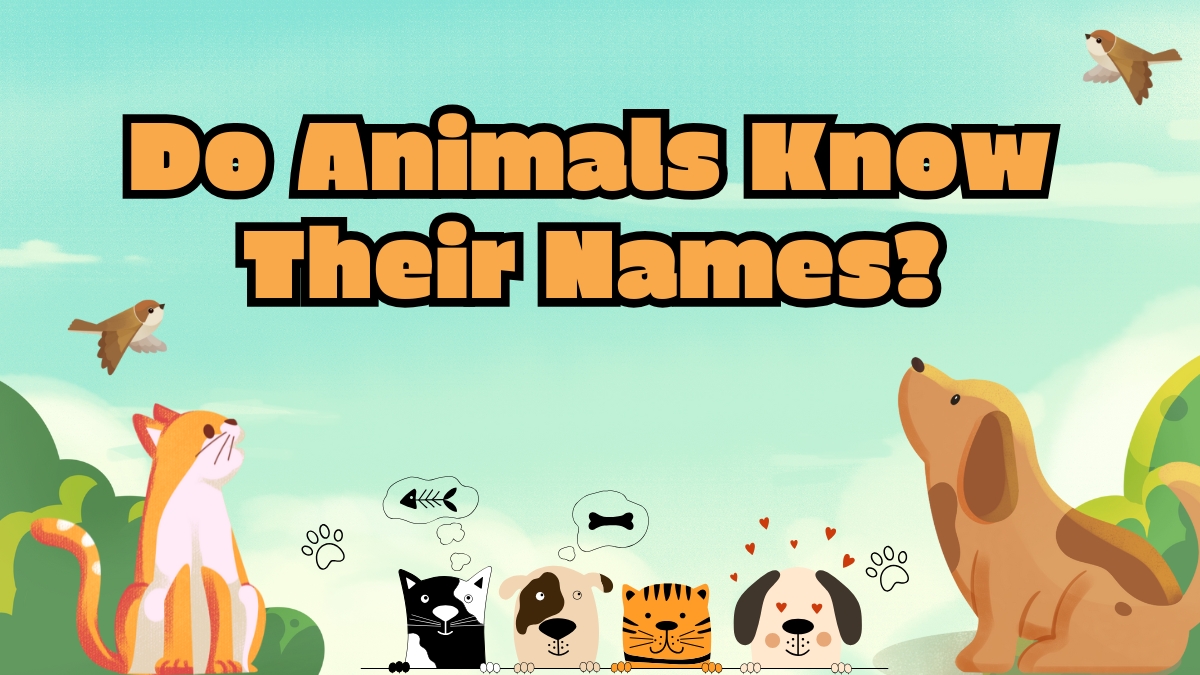You call your dog from the other side of the park, and he charges over to you with his tail in swing. When you mention your cat’s name, she responds with a slight tail movement or a quick look (if you’re fortunate). For those who have shared their lives with animals, it seems our pets know who they are or at the very least, they recognize the names we’ve given them.
However, do animals truly recognize their names? Do they understand their names the way we do, as labels linked to identity? Or do they simply respond to noises linked to rewards, focus, or particular results? This question connects animal behavior, cognition, linguistics, and the interaction between humans and animals. Let’s explore the science, stories, and theories that address this fascinating topic.
What Does It Mean to “Know a Name”?
Before advancing into research, explaining the meaning of “know a name” is important. Names for humans serve as identifiers linked to their sense of self and identity. When someone calls your name, you recognize it as referring specifically to you.
For animals, the idea is a bit different. Scientists typically frame name recognition as the ability to associate a particular sound (a name) with a specific response or concept. This might include:
- Turning toward the sound
- Coming when called
- Displaying specific behavior (e.g., wagging tail, perking ears)
- Differentiating their name from others in a group
These behaviors suggest some level of name recognition, even if it’s not tied to a sense of “self” in the human sense.
Dogs: The Name Game Champions
What the Research Says
Dogs are the most studied animals when it comes to name recognition, and there’s plenty of evidence that they do understand their names. Dogs can actually learn hundreds of human words, including nouns such as names.
This was illustrated by a well-known 2004 study featuring a Border Collie named Rico. Rico was familiar with more than 200 words and could retrieve objects by name, even if he had never encountered the word before. He used a form of “fast mapping,” a process similar to how children learn language.
A 2022 study conducted by researchers from Hungary and Japan examined dogs’ responses to their own names as opposed to other words. Dogs were played audio of their own names, common nouns, and names of well-known people or other pets. The dogs demonstrated greater attentiveness (as evidenced by head turns and EEG data) when their own name was called.
Training vs. Understanding
The majority of dog owners use positive reinforcement to train their dogs to respond to their names. A puppy learns that the sound of its name is linked to positive experiences when it hears its name and receives treats or attention. With time, the dog associates the name with the action of either looking at or coming closer to the individual.
Is knowing the name as an identifier equivalent to this? It may not be impressive in the human sense, but the mental process is still significant. Dogs can tell their names apart from other noises and may even disregard their name if the situation is unusual, indicating that it goes beyond basic training.
Cats: The Subtle Scholars
Surprising Feline Facts
For a long time, cats were believed to be indifferent or distant; however, that stereotype is being called into question by recent studies. In 2019, a study conducted by researchers at Sophia University in Japan discovered that domestic cats can differentiate their names from other similar-sounding words, even when these names are uttered by unfamiliar individuals.
The research included playing back recordings of four random nouns, with the cat’s real name followed after them. When their own name was played, most of the cats showed behavioral changes such as ear twitching, tail movement, or head turning.
Why Don’t They Always Come?
The reason cats don’t always come when called isn’t because they don’t recognize their names. It’s often because they simply don’t want to come. Cats are more independent than dogs and aren’t as driven by social reinforcement. But that doesn’t mean they aren’t listening.
Birds: Masters of Vocal Learning
Parrots and Name-Like Calls
Parrots, particularly African Greys and budgerigars, are known for their ability to mimic human speech. Even more fascinating is that wild parrots use particular vocalizations similar to “names” to distinguish individual birds.
Studies on wild parrot populations have revealed that parental figures assign a distinct vocal signature to each chick, which the chick utilizes throughout its life. Parrots can learn to respond to their names and even use them correctly in situations when kept in captivity.
Alex the African Grey parrot, studied by Dr. Irene Pepperberg, is one of the most famous examples. Alex not only knew his name, but could also identify colors, shapes, and even count. His interactions with humans suggest that some birds can understand far more than we give them credit for.
Dolphins: Personalized Whistles
The Whistle Code
In the wild, dolphins seem to have “names” like parrots do, however, they rely on distinct signature whistles rather than vocalizations. Every dolphin creates a unique whistle that serves as its audible name.
Research has demonstrated that dolphins react to recordings of their own whistles, but not to those of others. These whistles are also used for calling out to friends or family, even across great distances.
This indicates that dolphins not only acknowledge names but also socially generate and use them socially, which is incredibly rare in the animal kingdom.
Elephants: Remembering and Responding
With their high intelligence and deep social connections, elephants are remarkable creatures. In their natural habitat, they communicate through vocalizations and infrasound, and it is thought that they may use name-like sounds for identifying individuals.
In zoos and sanctuaries, trained elephants typically respond to their names specifically, rather than to any trainer’s call. Some researchers think that this exceeds basic conditioning, particularly when elephants react to their names from other elephants or when humans cannot be seen.
Other Animals: The Emerging Field
Horses
Horses have shown evidence of recognizing their names and responding with interest, especially when called by familiar handlers. One study observed that horses reacted more strongly to their own names compared to neutral words.
Rabbits, Rats, and Ferrets
Small mammals like rabbits and rats can learn their names, especially if trained from a young age. Ferrets, too, have shown responsiveness to name calls, particularly when tied to food or play.
Zoo Animals
In zoos, keepers often train animals to respond to names as part of husbandry routines. For example, gorillas and chimpanzees may be called by name during feeding or training sessions, and they learn to associate the sound with the reward.
The Science of Name Recognition
Associative Learning
At the core of name recognition in most animals is associative learning: linking a specific sound with a consequence. This can be positive (food, affection) or neutral (attention, interaction).
Operant Conditioning
Operant conditioning is commonly used in animal training, where behaviors (like coming when called) are reinforced through rewards. This is different from reflexive behavior, because it requires conscious participation by the animal.
Cognitive Recognition
True cognitive recognition of names—understanding that a sound refers to oneself—is much harder to prove. Still, studies with parrots, dolphins, and dogs suggest that some animals may grasp this concept, at least in a basic way.
Do Animals Know Each Other’s Names?
In households with multiple pets, animals often recognize the names of their fellow housemates. Canines might become more animated upon hearing the name of a beloved playmate. Before a vet trip, cats might respond when another cat’s name is mentioned.
A 2022 study discovered that dogs living with other dogs were able to match names to faces. They frequently gazed longer at the corresponding face when presented with images of known dogs on a screen while hearing a name. This implies they might acknowledge names, both of themselves and of others.
Can Animals Be Taught to Name Things?
Some animals can go beyond name recognition and actually learn to associate names with objects or concepts.
- Chaser the Border Collie knew over 1,000 words, many of which were names of toys. She could fetch them by name and even categorize them.
- Alex the Parrot could identify objects by color, shape, and number, and he used labels appropriately.
This shows that animals not only learn names but may also use naming as a form of categorization or communication.
Emotional Response to Names
Beyond recognition, many animals show emotional responses to their names—especially when spoken in a certain tone.
- Dogs often wag their tails, perk up, or look excited when their name is spoken in a happy voice.
- Cats may purr, come closer, or blink slowly.
- Parrots may repeat their names or use them in vocal play.
- Dolphins and elephants respond to names used by others in their group, suggesting a social and emotional dimension.
This emotional layer shows that name recognition isn’t just cognitive—it’s relational.
So, Do Animals Really Know Their Names?
The answer is: yes, many animals recognize their names, at least in a functional sense. For dogs, cats, parrots, dolphins, and even a few small mammals, the occurrence of name recognition is both scientifically validated and backed by experience.
Although it is unlikely that animals understand names in the same manner as humans, they do link those sounds to themselves and respond accordingly. For species such as dolphins and parrots, there is strong evidence of socially constructed naming systems that more closely mirror human usage than we might anticipate.
Final Thoughts
The question whether animals recognize their names sparks larger discussions about animal intelligence, communication, and our relationships with non-human companions. It serves as a reminder that animals are not simply passive objects of training, but active participants in relationships—ones who learn, remember, and sometimes surprise us with how much they understand.
The next time you call your pet and they turn their head, twitch an ear, or come running, keep in mind: they’re not just hearing a sound. They could simply be responding to their true selves.
And just like animals respond to names that feel personal, humans have long used nicknames to create closeness, identity, and sometimes even mystery. Explore more in our next article: Why Do We Use Nicknames? and uncover the psychology, history, and heart behind the names we give each other.




